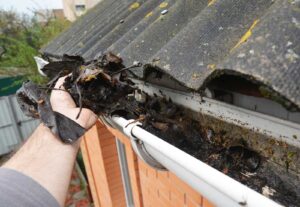Clogged Gutters and the Damage They Cause
At the most basic level, gutters are troughs that sit at the edge of your roof to carry off any rainwater. However, when they’re not functioning properly, your home could become vulnerable to a number of long-term, costly damages.
Clogged gutters will
- Damage your roof and walls
- Weaken the foundation of your home
- Put the health of your family at risk
- Destroy your yard and landscaping
The whole purpose of gutters is to facilitate the flow of rainwater, bringing it from the roof to the ground and to a space designated for it. Clogged gutters seem like a small issue, but they actually cause a lot of silent damage that can be pricey, serious business.
You may know about the importance of inspecting the foundation or caring for the landscape, but what about your gutters? Keep reading to learn the signs of clogged gutters and more about the damage that neglecting this vital home maintenance task can cause.
Signs of Clogged Gutters
There are some telltale signs that your gutters are clogged regardless of where you live or the climate. The most obvious one that comes to mind for everyone is when water begins spilling over the sides of your gutters, but there are others as well that may not be quite as obvious, or attributed to other, minor issues.
Here are some strong indicators that your gutters need attention.
Insects and Pests
Insects love the wet conditions of dirty and unkempt gutters. Creepy crawlies will swarm around these conditions and make their home in your gutter. Once the conditions are perfect and insects have claimed your gutters, it’s pretty typical to find a teeming spider’s nest or cloud of mosquitoes swarming around outside your home. With enough time, snakes, rats, frogs, and lizards might join them.
And, they will invite themselves inside as well.
By creating an environment outside your home that encourages pests to come around, it also encourages them to use open windows, doors, or water damage from clogged gutters to enter your home and endanger your health.
Stains Inside and Out
Another good indicator that you have clogged gutters is staining. For the exterior of your home, this is the precursor to more serious damage. Staining on your siding or on the downspouts and gutters is a telltale sign that the gutters have been overflowing due to a clog.
Inside the home, stains on the ceiling or in the attic can sometimes indicate that your gutters are clogged and already causing damage. Water accumulates on your roof and, with nowhere else to go, it slowly begins to seep into your home at jointed spots, like where your roof meets the siding (the fascia board) and the underside of your exposed roof (the soffit).
The longer water is allowed to sit on your roof, the more costly the repairs will be and might result in replacing your roof altogether.
Sagging and Damaged Gutters
 Gutters that haven’t been maintained tend to sag under the excess weight of all the water and debris that has built up in them. Sagging gutters alone isn’t particularly damaging to your property as a whole, but as they start pulling away from your roof the gutter could detach and bring part of your home’s exterior with it.
Gutters that haven’t been maintained tend to sag under the excess weight of all the water and debris that has built up in them. Sagging gutters alone isn’t particularly damaging to your property as a whole, but as they start pulling away from your roof the gutter could detach and bring part of your home’s exterior with it.
If gutters are made out of lower quality materials or are allowed to sag for long enough, the damage to them will be too much and gutter replacement or repair may be necessary.
Plants Growing in Your Gutters
When you don’t clean your gutter on a regular basis, organic matter tends to collect in your gutter system. This dirt and debris, combined with the sunshine and moisture, create the perfect environment for seeds or fungi to sprout.
Your gutters can become a planter for hearty weeds, grass, plants, and even flowers if they aren’t maintained. Whether you want plants or not, the gutter isn’t the right place for them.
What are the Dangers of Clogged Gutters?
When you have clogged gutters, your home has no way of draining water after heavy rain. This is especially taxing to your home if you live in southern cities like Charlotte that can get hit with summer rain and the occasional tropical storm.
These points below illustrate exactly what clogged gutters do to your home and why you need to avoid them:
-
Your Roof and Walls Will Be Damaged
 When gutters become clogged by debris, water will sit until it begins to seep through the roof and walls. As this happens, you’ll notice leaks inside your home as well as cracks developing in your roof due to the water. As time goes on, the leaks will worsen until you get rid of the standing water and clear your gutters.
When gutters become clogged by debris, water will sit until it begins to seep through the roof and walls. As this happens, you’ll notice leaks inside your home as well as cracks developing in your roof due to the water. As time goes on, the leaks will worsen until you get rid of the standing water and clear your gutters.The impact of clogged gutters on your roof aside, other damage to your home might include the walls as gutters separate from the structure, and as we’ll go over next, your foundation. If the damage is allowed to progress, it’ll seep into the interior of your home, impacting the walls and even electrical systems.
-
The Foundation will be Compromised
When water cannot be properly drained from your property, your foundation will also be impacted. Water pools at the wall of your foundation and, much like on the roof, it will sit until it begins to destabilize it. The foundation is the most important part of your entire house. When that’s compromised, the whole house is in danger.
A foundation repair from a Charlotte contractor can cost between approximately $2000 and $6000. Taking care of your gutters is a much easier way to sustain the foundation and far less costly.
-
Clogged Gutters May Lead to Illness
It’s only a matter of time before standing water turns into mold and mildew. Getting rid of either one can be a pricey proposition, as contractors charge between $500 and $6,000.
Aside from the price you will have to pay to get rid of it, it’s also very dangerous for your health. While some molds are relatively benign, others can do a lot to hurt your overall health. Also, sitting water that’ll accumulate because of this growth will lead to the perfect haven for mosquitos.
-
Your Yard and Landscape will Suffer
It might seem like a small detail compared to potential cracked foundations, but clogged gutters can result in destroyed landscaping. All the hard work that you put into your grass, flower beds, and shrubs will go to waste if you let your gutters clog. If water spills off in random places because your gutters aren’t working properly during a big storm, your meticulous landscaping could be washed away. You may also notice puddles in your lawn and will need to re-plant grass that is too damaged to grow continuously.
For many people, one of the biggest joys of homeownership is taking care of a yard. Homeownership and love of landscaping aside, curb appeal is a huge determining factor in your property value. When it comes to selling your home, this goes much deeper than simple appearances.
In addition to the physical damage and health risks of clogs, a clogged gutter system can do an entirely different type of damage: financial. The chart below shows estimates of the costs associated with damage to your home.
Cost Breakdown of Water Damage |
|
| Replacements | Cost |
| Roof (1,000 sq ft) | $4,000 to $5,500 |
| Gutter System | $1,000 to $5,000 |
| Lighting | $150 to $350 |
| Soffit & Fascia | $2,500 (average) |
| Total | $7,650 to $13,350 |
| Repairs | Cost |
| Ceiling repair | $325 to $1,100 |
| Drywall repair | $275 to $785 |
| Electrical | $1,500+ |
| Total | $2,100 to $3,385 |
Price estimates are based on the average market value of materials and labor for the average 1,000 sq. ft. home with a total roof size of about 1,200 sq. ft.
Paying anywhere from $2,000 to over $13,000 is a much larger expense than the $150 or so it would cost to have your gutters professionally cleaned.
How to Clean Clogged Gutters
For most homeowners, gutter cleaning and maintenance should happen one or two times per year. If you live somewhere that experiences heavy rain and plenty of leaves during the fall, it might be worth it to clean out your gutters quarterly.
Clean Them Yourself
We strongly advise against cleaning your own gutters. While yes, it is doable with the right equipment and some help, it’s a dangerous DIY project due to the risk of falling. However, if you decide to clean your own gutters, you’ll need a ladder, safety equipment, a water source (like a pressure washer or extra long water hose,) and a helper. Wait for a particularly dry, sunny day and carefully remove debris from your gutters and then flush your gutter system with water.
Hire a Professional Today
Hiring professional gutter cleaning services in Charlotte is a cost-effective and smart way to keep your home in tip-top shape. Start reaching out to a few seasoned professionals to make sure you’re spending your money with a company that gets the job done correctly.
Now that you know how much of a silent danger clogged gutters are to your home, take a look at how we can help and contact us for a free price quote today!
Frequently asked questions about clogged gutters
Curious about the details surrounding gutter cleaning? Browse our frequently asked questions below to learn more.
How do you unclog a gutter?
We recommend hiring professionals for this task, but to do it yourself you’ll need a pressure washer, ladder, tools, safety gear, and a helping hand to pull debris and build up from your gutter system, repair any loose or damaged gutters, and then a pressure washer to flush your system of any leftover debris.
What happens when your gutters are clogged?
Water overflows unto your roof and ground below while jeopardizing your home’s structure. You’ll also notice stains on the windows and exterior walls of your home and, in cases where the damage has become severe, water will seep into your home, staining the ceiling and interior walls.
Can clogged gutters damage your roof?
Absolutely. Clogged gutters will cause water to build up and sit on your roof. That water will then seep into your home, damaging the shingles, roof, and more. It can also cause your gutter system to become warped and weighted before separating from your home’s structure, taking part of the roof with it.
How do you check if downspouts are clogged?
Look for signs of flowing water. If no water is flowing from your downspouts at all, it’s a sign that they are completely blocked somewhere along the line. If debris is coming out with moving water, that’s also a sign of a clog, albeit a less significant one.


